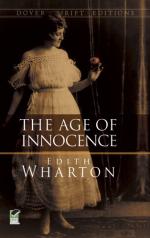Beyond the small and slippery pyramid which composed Mrs. Archer’s world lay the almost unmapped quarter inhabited by artists, musicians and “people who wrote.” These scattered fragments of humanity had never shown any desire to be amalgamated with the social structure. In spite of odd ways they were said to be, for the most part, quite respectable; but they preferred to keep to themselves. Medora Manson, in her prosperous days, had inaugurated a “literary salon”; but it had soon died out owing to the reluctance of the literary to frequent it.
Others had made the same attempt, and there was a household of Blenkers—an intense and voluble mother, and three blowsy daughters who imitated her—where one met Edwin Booth and Patti and William Winter, and the new Shakespearian actor George Rignold, and some of the magazine editors and musical and literary critics.
Mrs. Archer and her group felt a certain timidity concerning these persons. They were odd, they were uncertain, they had things one didn’t know about in the background of their lives and minds. Literature and art were deeply respected in the Archer set, and Mrs. Archer was always at pains to tell her children how much more agreeable and cultivated society had been when it included such figures as Washington Irving, Fitz-Greene Halleck and the poet of “The Culprit Fay.” The most celebrated authors of that generation had been “gentlemen”; perhaps the unknown persons who succeeded them had gentlemanly sentiments, but their origin, their appearance, their hair, their intimacy with the stage and the Opera, made any old New York criterion inapplicable to them.
“When I was a girl,” Mrs. Archer used to say, “we knew everybody between the Battery and Canal Street; and only the people one knew had carriages. It was perfectly easy to place any one then; now one can’t tell, and I prefer not to try.”
Only old Catherine Mingott, with her absence of moral prejudices and almost parvenu indifference to the subtler distinctions, might have bridged the abyss; but she had never opened a book or looked at a picture, and cared for music only because it reminded her of gala nights at the Italiens, in the days of her triumph at the Tuileries. Possibly Beaufort, who was her match in daring, would have succeeded in bringing about a fusion; but his grand house and silk-stockinged footmen were an obstacle to informal sociability. Moreover, he was as illiterate as old Mrs. Mingott, and considered “fellows who wrote” as the mere paid purveyors of rich men’s pleasures; and no one rich enough to influence his opinion had ever questioned it.




